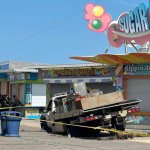“At least we are alive.”
Heart wrenching is a shallow assessment to describe the disaster that whirled out of the gray sky upon the 55,081 residents of Moore, Okla. While there are many Garden State residents who suffered same loss in Hurricane Sandy, they had notice in ample time to evacuate. So many in that Midwestern town had no lengthy warning of impending disaster that doom would come so swiftly. Those Oklahomans had only their gut intuition that at this time of year, tornado activity is likely to be expected.
As Cape May County tries to gather emergency resources for the next hurricane or other natural disaster, a look at the impact on Moore may be worthwhile to consider. There is a group forming here that will deal with long-term recovery. That term extends past the initial disaster to the month and years later. As with any disaster, we Americans are quick to help, give blood, send money, and that takes care of the immediate needs. Then the hard part settles in, when the aid is gone, the money spent, and there is a life yet to unfold.
Few of us can fathom the mountains of rubble that once were homes to so many families. How does one put their life back together after everything, and I mean everything, is gone in an instant? Imagine all your personal possessions gone. All family heirlooms aregone. All clothing gone, save what you have on your back. Every scrap of furniture is gone. The car or truck is possibly upside down a quarter mile from where it was parked. Can we imagine such destruction, and that in the twinkling of an eye?
Think further of the community impact. Not only were the residents’ personal possessions gone, but their churches and synagogues are gone. The bank where they had their accounts, most likely gone. Their checks and computers, with all their life history and passwords, gone. For those spared how many lost their place of employment? Food stores, gone, clothing stores, gone. Everything just vanished.
Still, those resolute souls faced cameras on national television and, in the most stoic tone uttered the phrase at the time of this column, “At least we are alive.”
Folks who have traveled to Louisiana in portions devastated by Hurricane Katrina have told me there are some down there who have yet to be “made whole” for their loss. Still others never went back, simply left the old house and departed for parts unknown.
Through the wonder of cell phones, the nation would see what some of the teachers experienced as they crouched in darkness inside their schools with that “freight train overhead” covering pupils as best they could from F-5 winds that reportedly reached over 300 mph. Unless one lives through such an awful five minutes that must seem an eternity, it is impossible to understand the thoughts that races through their minds.
Also interesting is that in such times of peril and utter devastation, there is no prohibition or worrying about being “politically correct.” People freely proclaim, “Thank God we were spared.” or “I was praying to God to save me and my children.” That’s like the old adage “No atheists in a fox hole.” It reinforces my conviction that there remain many who believe in God, and when they don’t cloak their belief, will freely offer thanks to God Almighty.
On the ABC Evening News, I heard a man (did not see his name) state that, in times of such disasters, the government will be there, and the government will help, but it’s the Baptist men who are there with blankets and food and chain saws right away, ready to do what they can.
That is what this country is truly made of, what makes it great. Americans did not wait for government to step in and be their benevolent protector. Neighbors banded together and were there with a pot of soup, a fresh loaf of bread and a room to stay in while the embers were still smoldering. That is what and who we are, and, I trust, will ever remain.
Cape May County residents should look to Moore, Okla., and wonder what they would do; what plans they have in place that would be used to reconstruct towns and lives. It is the place where the long-term recovery team will find its place. The Cape May County Long Term Recovery Team, initially started to aid Hurricane Sandy victims, is certainly something that every volunteer should consider joining. It is not a matter of “will it happen?” It is fact that, living by the mighty Atlantic, only time will change but we will see here the same sad sights we saw in Oklahoma. As the small placard read, “Plan ahead. It wasn’t raining when Noah built the ark.”







